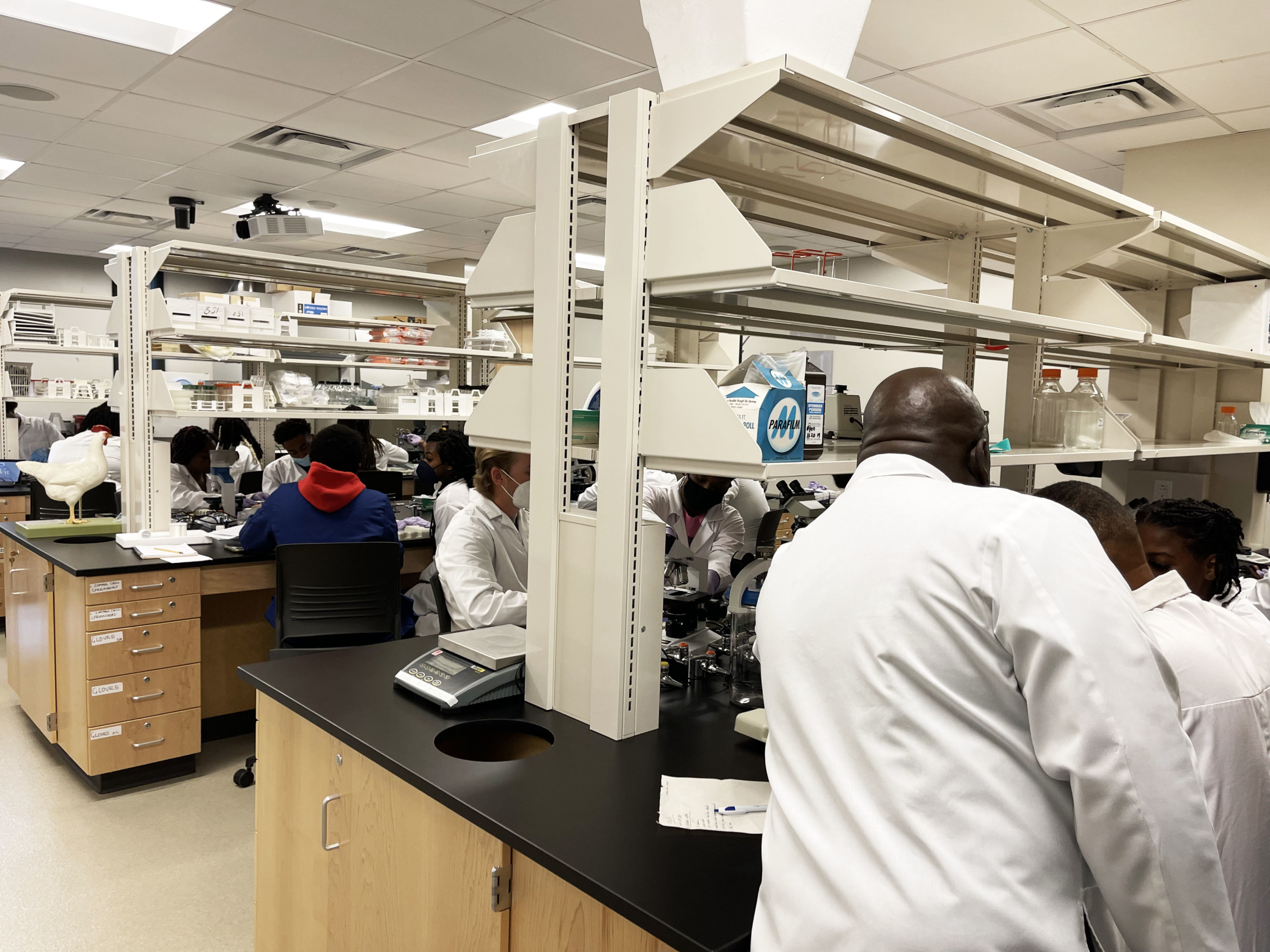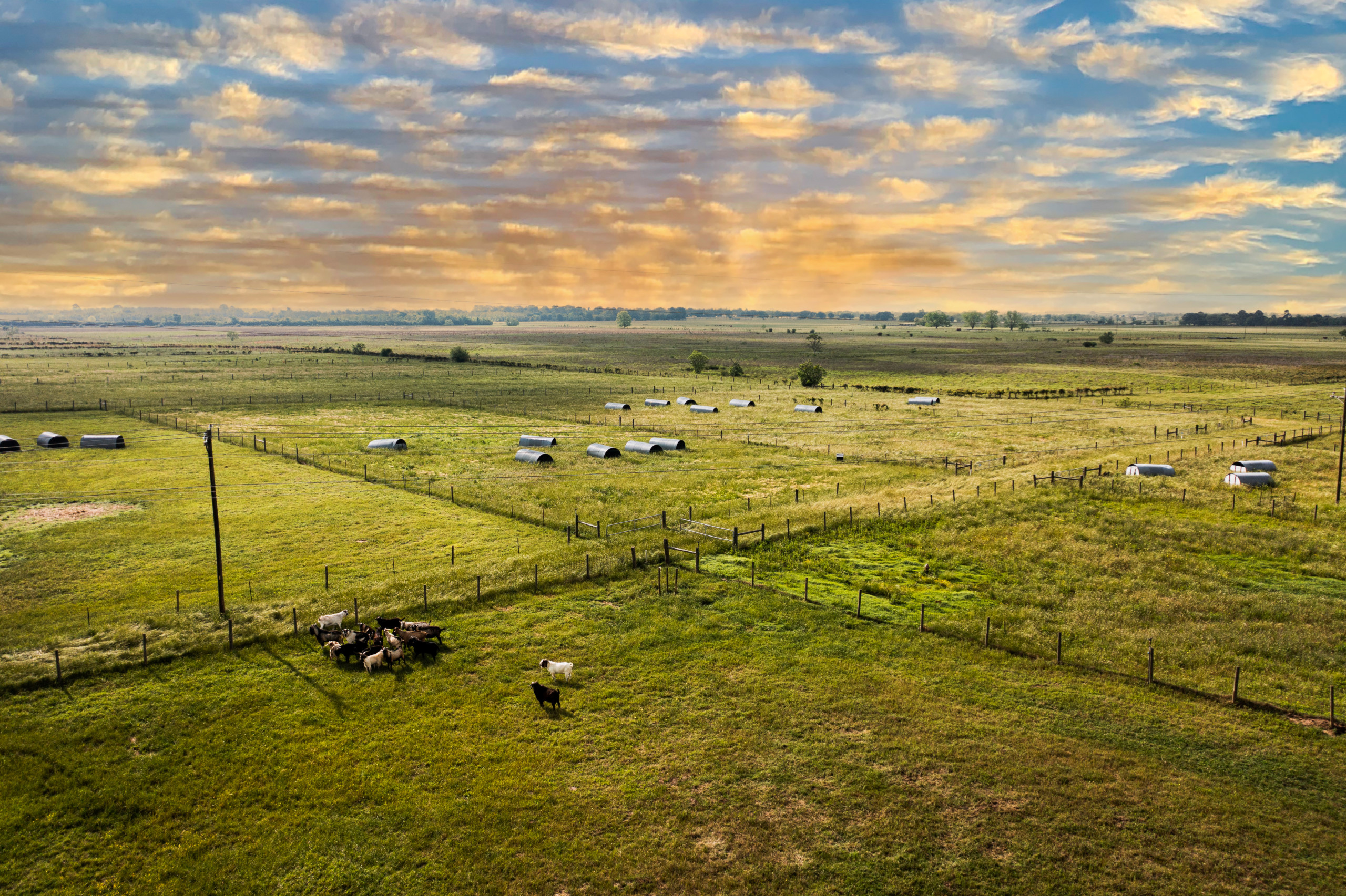Why CAFNR at PVAMU?
Academics
Program Entry Requirements
Students enrolled in a degree program in the College of Agriculture, Food and Natural Resources are required to fulfill the university requirements for successful academic progress toward graduation. In addition, students are expected to:
Earn an overall grade point average of 2.50 in courses required for the degree beyond the University core, but which are not offered by programs within the college.
Students who wish to transfer from other colleges and universities to the college must have a minimum grade point average of 2.50 in transfer credits accepted by the respective program for unconditional admission, in addition to satisfying the general requirements specified in this catalog.
Students within the university who wish to transfer to the college must have a minimum grade point average of 2.25 in transfer credits accepted by the respective program for unconditional admission.
Contact Us
Department of Agriculture, Nutrition and Human Ecology
Agriculture and Business Multipurpose Building
805 A.G. Cleaver Street
Prairie View, TX 77446
Phone: (936) 261-2540
Fax: (936) 261-2501
Email: kwaddo@pvamu.edu
USDA Quick Reference Guide
The United States Department of Agriculture (USDA) works to support the American agricultural economy to strengthen rural communities; to protect and conserve our natural resources; and to provide a safe, sufficient, and nutritious food supple for the American people. The Department’s wide range of programs and responsibilities touches the lives of every American every day. This factsheet provides information about some of our agencies and offices, their missions, responsibilities, and the services they provide. To learn more about USDA and the millions of ways they serve the American people every day, please visit www.usda.gov or call (202) 720-2791.
Farm Service Agency – The Farm Service Agency (FSA) ensures the well-being of American agriculture, the environment and the American public through the administration of farm commodity programs; farm ownership, operating, and emergency loans; conservation and environmental programs; emergency and disaster assistance, and domestic and international food assistance. FSA programs are delivered through an extensive network of field offices in 2,119 USDA County Service Centers and 51 State Offices. FSA Information: www.fsa.usda.gov (202) 720-3467
Foreign Agricultural Services – The Foreign Agricultural Services (FAS) works to improve foreign market access for U.S. products and administers market development and export finance programs. FAS helps U.S. develop and maintain markets overseas for U.S. food and agricultural products. FAS help developing countries improve their agricultural systems and build their trade capacity. FAS Information www.fas.usda.gov (202) 720-7115
Risk Management Agency – The Risk management Agency (RMA) administers the Federal Crop Insurance Corporation (FCIC) programs and promotes national welfare by improving the economic stability of agriculture though a secure system of crop insurance and risk management tools. Though network of public and private-sector partners. RMA creates crop insurance and risk management products, provides risk management education and outreach, and ensures program accessibility and integrity. RMA Information www.rma.usda.gov (202) 690-2803
Center for Nutrition Policy and Promotion – The Center for Nutrition Policy and Promotion (CNPP) establishes Federal nutrition policy through the Dietary Guidelines for Americans, sets priorities for nutrition research, sets nutrition standards, and disseminates dietary guidance. It maintains the MyPlate food guidance system. CNPP Information www.cnpp.usda.gov (703) 305-7600
Food and Nutrition Service – The Food and Nutrition Service (FNS) administers the USDA nutrition assistance programs that provide children and low-income people access to food, a healthful diet, and nutrition education. Programs include the Supplemental Nutrition Assistance Program (SNAP, formerly called the Food Stamp Program), the Special Supplemental Nutrition Program for Women, Infant and Children (WIC), the School Lunch and Breakfast Programs, among others. FNS Information www.fns.usda.gov (703) 305-2281
Agricultural marketing Service – The Agricultural Marketing Service (AMS) Administers programs that facilitate efficient, fair marketing of U.S. agricultural products, including food, fiber, and specialty crops. AMS identifies and promotes the development of marketing opportunities for the agricultural community by conduction and supporting research and providing information on farmer direct marketing activities. AMS programs promote a strategic marketing perspective that adapts product and marketing practices and technologies to issues of today and the challenges of tomorrow. AMS Information www.ams.usda.gov (202) 720-8998
Animal and Plant Health Inspection Service – The Animal and Plant Health Inspection (Service APHIS) makes a significant contribution to the value of the nation’s food supply by protecting U.S. agricultural resources from pests and diseases, managing wildlife damage, regulating genetically engineered organisms, and administering the Animal Welfare Act. APHIS programs integrate plant and animal disease surveillance, epidemiology, emergency response, and information delivery to ensure the marketability of U.S. agricultural products. APHIS also works to resolve and manage trade issues related to animal or plant health. APHIS Information www.aphis.usda.gov (301) 851-4049
Grain Inspection, Packers and Stockyards Administration – The Grain Inspection, Packers and Stockyards Administration (GIPSA) facilities the marketing of livestock, poultry, meat, cereals, oilseeds, and related agricultural products, The agency promotes fair and competitive trading practices for the overall benefit of consumers and American agriculture. GIPSA Information www.gipsa.usda.gov (202) 720-219
Forest Service – The Forest Service (FS) manages 193 million acres of public lands in 155 nation forest and 20 grasslands and is the largest forestry research operation in the world. The Forest Service provides technical and financial assistance to help rural and urban citizens, watersheds, and rangelands in their communities. FS Information www.fs.usda.gov (202) 205-1680
Natural Resources Conservation Service – The Natural Resource and Conservation Service (NRCS) helps people help the land through scientifically based, locally led voluntary conservation efforts and improve natural resources on private lands. NRCS work results in productive lands and a healthy environment through reduced soil erosion: restored woodlands and wetlands; enhanced fish and wildlife habitat; and reduced upstream flooding. NRCS Information: www.nrcs.usda.gov (202) 720-3210
Agricultural Research Service – The Agricultural Research service (ARS) is the principal in-house research agency of the USDA. ARS is charged with extending the Nation’s scientific knowledge through the administration of its national programs, as well as by conducting research projects in animal and crop production and protection, human nutrition, food safety, bioenergy, the environment, and other topics that affect the American people on a daily basis. ARS Information: www.ars.usda.gov (301) 504-1636
Economic Research Service – The Economic Research Service (ERS) is a primary source of economic information and research in USDA. ERS conducts its research program to inform public and private decision making on economic and policy issues involving food, farming, natural resources, and rural development. ERS’s economists and social scientists conduct research, analyze food and commodity markets, produce policy studies, and develop economic and statistical indicators. ERS staff disseminates economic information and research results through an array of outlets. ERS Information www.ers.usda.gov (202) 695-5000
National Agricultural Statistics Service – The National Agricultural Statistics Service (NASS) is the official Federal statistical agency for agriculture. The agency serves U.S. agricultural and rural communities with accurate, timely, and useful statistical products and services that are vital information to monitor the ever-changing agricultural sector and carry out FARM POLICY. Every 5 years, NASS conducts the Census of Agriculture, which is the only source of uniform, comprehensive agricultural data for every county in the United States. NASS Information: www.nass.usda.gov (800) 727-9540
National Institute of Food and Agriculture – The National Institute of Food and Agriculture (NIFA) impacts the lives of millions Americans each day by supporting exemplary research, education, and Extension that address many challenges facing our Nation through collaboration with Historically Black Colleges and Universities (HBCUs), Hispanic-serving institutions, and Tribal colleges. You are connected to NIFA through your nearest Extension office, which provides answers to concerns through educational materials and web-based information. NIFA Information www.nifa.usda.gov (202) 720-7441
Rural Development – USDA Rural Development (RD) is composed of Rural Business-Cooperative Programs, Rural Housing and Community Facilities Programs, and Rural Utilities Programs. RD offers rural communities a broad array of financial, technical, and educational resources in order to establish and grow rural business and cooperatives. RD provides financing for single family homes and multi-family housing developments, and essential community facilities. RD helps to finance the development of electric, telephone, telecommunication, and water wastewater infrastructures to create affordable utilities. RD Information www.rd.usda.gov (800) 670-6553
National Appeals Division – The National Appeals Division (NAD) is responsible for providing bearings for program participants who receive adverse decisions form the Farm Service Agency, Risk Management Agency, Natural Resources Conservation Service, and Rural Development’s Rural Business-Cooperative Service, Rural Housing Service, and Rural Utilities Service. Filing an appeal provides an opportunity to present the dispute, either face to face or on the telephone, to a NAD Hearing Officer. NAD Information www.nad.usda.gov (877) 487-3262
Departmental Management – Departmental Management (DM) is USDA’s central administrative management organization providing support to policy and program officials and overall direction and coordination for the administrative programs and services of USDA. DM Information www.dm.usda.gov (202) 720-3291





